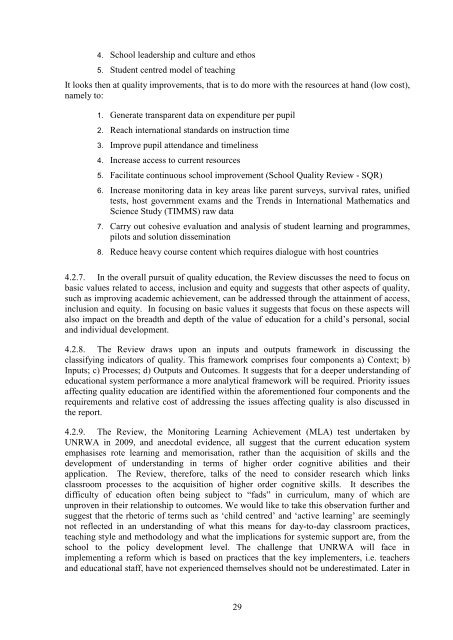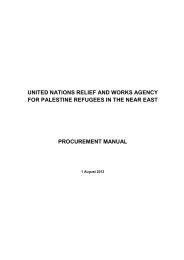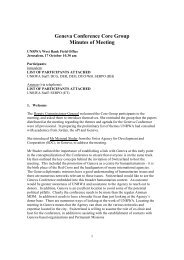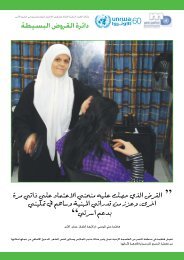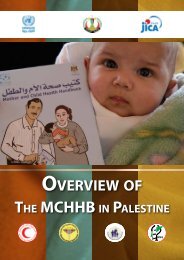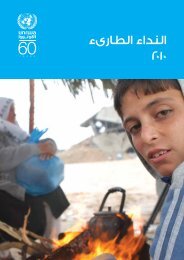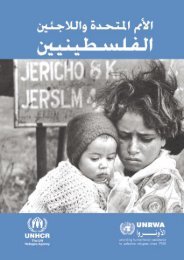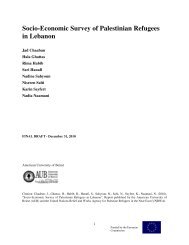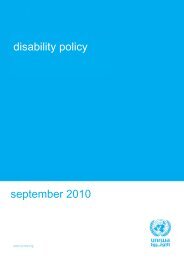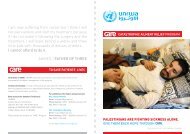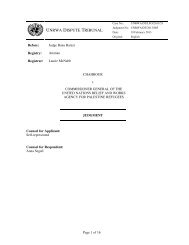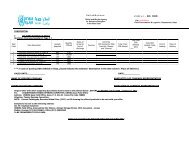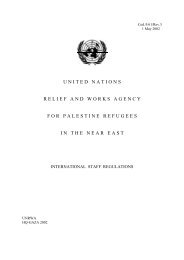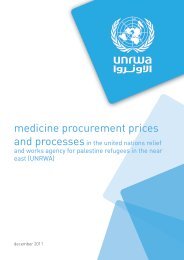Education Reform Strategy - Unrwa
Education Reform Strategy - Unrwa
Education Reform Strategy - Unrwa
Create successful ePaper yourself
Turn your PDF publications into a flip-book with our unique Google optimized e-Paper software.
4. School leadership and culture and ethos<br />
5. Student centred model of teaching<br />
It looks then at quality improvements, that is to do more with the resources at hand (low cost),<br />
namely to:<br />
1. Generate transparent data on expenditure per pupil<br />
2. Reach international standards on instruction time<br />
3. Improve pupil attendance and timeliness<br />
4. Increase access to current resources<br />
5. Facilitate continuous school improvement (School Quality Review - SQR)<br />
6. Increase monitoring data in key areas like parent surveys, survival rates, unified<br />
tests, host government exams and the Trends in International Mathematics and<br />
Science Study (TIMMS) raw data<br />
7. Carry out cohesive evaluation and analysis of student learning and programmes,<br />
pilots and solution dissemination<br />
8. Reduce heavy course content which requires dialogue with host countries<br />
4.2.7. In the overall pursuit of quality education, the Review discusses the need to focus on<br />
basic values related to access, inclusion and equity and suggests that other aspects of quality,<br />
such as improving academic achievement, can be addressed through the attainment of access,<br />
inclusion and equity. In focusing on basic values it suggests that focus on these aspects will<br />
also impact on the breadth and depth of the value of education for a child’s personal, social<br />
and individual development.<br />
4.2.8. The Review draws upon an inputs and outputs framework in discussing the<br />
classifying indicators of quality. This framework comprises four components a) Context; b)<br />
Inputs; c) Processes; d) Outputs and Outcomes. It suggests that for a deeper understanding of<br />
educational system performance a more analytical framework will be required. Priority issues<br />
affecting quality education are identified within the aforementioned four components and the<br />
requirements and relative cost of addressing the issues affecting quality is also discussed in<br />
the report.<br />
4.2.9. The Review, the Monitoring Learning Achievement (MLA) test undertaken by<br />
UNRWA in 2009, and anecdotal evidence, all suggest that the current education system<br />
emphasises rote learning and memorisation, rather than the acquisition of skills and the<br />
development of understanding in terms of higher order cognitive abilities and their<br />
application. The Review, therefore, talks of the need to consider research which links<br />
classroom processes to the acquisition of higher order cognitive skills. It describes the<br />
difficulty of education often being subject to “fads” in curriculum, many of which are<br />
unproven in their relationship to outcomes. We would like to take this observation further and<br />
suggest that the rhetoric of terms such as ‘child centred’ and ‘active learning’ are seemingly<br />
not reflected in an understanding of what this means for day-to-day classroom practices,<br />
teaching style and methodology and what the implications for systemic support are, from the<br />
school to the policy development level. The challenge that UNRWA will face in<br />
implementing a reform which is based on practices that the key implementers, i.e. teachers<br />
and educational staff, have not experienced themselves should not be underestimated. Later in<br />
29


